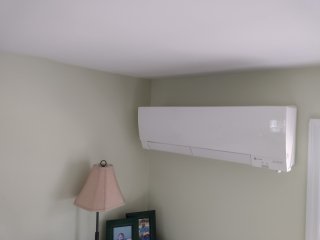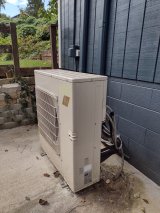Heat Pumps
- Types of Heat Pumps
- Efficiency and Maintenance
- Tax Credit and Consumer Rebate Details
- Additional Resources
NOTE: When considering a new appliance, be sure to check the federal Clean Energy Tax Credits for Consumers.
Types of Heat Pumps
A heat pump is a system installed outside of your house that can both heat and cool your home, eliminating the need for separate systems. Installing a heat pump can lower your heating bill since they are cleaner and more energy-efficient than most other types of home heating.

Similar to a refrigerator, heat pumps use electricity to transfer thermal energy (or heat) from outside air to heat a home. A heat pump typically uses about half the energy of other electric home-heating sources. This is because heat pumps don't actually create heat, they just transfer it from one place to another. The system absorbs existing heat through refrigerant lines and releases that heat into your home, eliminating the need for separate systems. Most heat pumps can also cool a house by operating in reverse, removing heat from the indoors.

Heat pumps can also be used as efficient space heaters. If you use a heat pump in conjunction with your main source of heat, such as a hot-water baseboard heater, that baseboard heater does not have to work as hard to keep the house warm on a very cold night.
New heat pump technology allows them to perform even in cold climates. Refer to the Northeast Energy Efficiency Program's cold climate air source heat pump list for more information or consult with a local professional.
- Air-source heat pumps: the most common choice, they transfer heat between your house and the outside air. High-efficiency heat pumps can also remove humidity better than standard central air conditioners, while using less energy. Because of recent technological improvements, air-source heat pumps are now more effective space heating options in colder climates (5 degrees Fahrenheit and colder).
- Ductless air-source heat pumps: homes without existing ducts might want to consider a ductless, or mini-split, heat pump. The mini-split is the most affordable and adaptable type of heat pump and is easier to install.
- Geothermal heat pumps: also called ground-source or water-source heat pumps, this equipment uses relatively constant ground or water temperatures to transfer heat between your house and the ground or a nearby water source. Although they cost more to install, geothermal heat pumps have low operating costs. You should consider the size of your property, the climate, soil conditions and the landscape when determining the best type of geothermal heat pump system. Ground-source or water-source heat pumps can be used in more extreme climates than air-source heat pumps.
- Absorption heat pumps: also called a gas-fired heat pumps, this equipment is a newer option. These systems use heat or thermal energy from natural gas, air, or solar or geothermal-heated water as an energy source.
Efficiency and Maintenance
Heat pumps are considered one of the most energy-efficient methods for heating

and cooling a home, especially compared to homes heated with baseboard electric heat, heating oil or propane. However, a heat pump system that is too large or too small can reduce energy efficiency and potentially increase maintenance costs. Make sure the size and capacity of your heat pump system match the area of the space it is intended to heat and cool.
Otherwise, heat pumps require minimal maintenance. Cleaning or changing the filters monthly or as needed optimizes performance. Maintain the system according to manufacturer's instructions and have a professional technician service your heat pump at least once a year.
Tax Credit and Consumer Rebate Details
The federal Clean Energy Tax Credits for Consumers covers 30 percent of the cost of heat pumps, capped at $2,000 each year, but resets annually so it can be used for other projects. Both homeowners and renters are eligible for tax credits for certain equipment and energy efficiency upgrades, including the installation of new electric panels. The U.S. Department of Energy’s Home Upgrades webpage has details on eligible appliances, rebates and tax credits.
Additional Resources
- Department of Energy Heat Pump Systems
- EPA Energy Star Air-Source Heat Pumps
- Department of Energy: Video- How Lower Elwha Klallam Tribe is Cutting Energy Costs
- Comfort Ready Homes: Resources for Homeowners
- Efficiency Maine: Heat Pump User Tips
